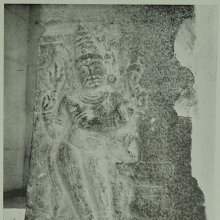Eman, Emaṉ, Ēmaṉ: 4 definitions
Introduction:
Eman means something in Hinduism, Sanskrit, Hindi, biology, Tamil. If you want to know the exact meaning, history, etymology or English translation of this term then check out the descriptions on this page. Add your comment or reference to a book if you want to contribute to this summary article.
Images (photo gallery)
Biology (plants and animals)
Source: Google Books: CRC World Dictionary (Regional names)Eman in Nigeria is the name of a plant defined with Oxytenanthera abyssinica in various botanical sources. This page contains potential references in Ayurveda, modern medicine, and other folk traditions or local practices It has the synonym John H. Barnhart, Biographical Notes upon Botanists. 1: 224. 1965 (among others).
Example references for further research on medicinal uses or toxicity (see latin names for full list):
· Botanische Jahrbücher für Systematik, Pflanzengeschichte und Pflanzengeographie (1907)
· Boll. Soc. Ort. Mutuo Soccorso. (1910)
· Tentamen Florae Abyssinicae … (1850)
· Transactions of the Linnean Society of London (1868)
· Taxon (1957)
· Boll. R. Orto Bot. Giardino Colon. (1909)
If you are looking for specific details regarding Eman, for example extract dosage, side effects, health benefits, chemical composition, pregnancy safety, diet and recipes, have a look at these references.

This sections includes definitions from the five kingdoms of living things: Animals, Plants, Fungi, Protists and Monera. It will include both the official binomial nomenclature (scientific names usually in Latin) as well as regional spellings and variants.
Languages of India and abroad
Sanskrit dictionary
Source: Cologne Digital Sanskrit Dictionaries: Monier-Williams Sanskrit-English Dictionary1) Eman (एमन्):—[from etṛ] ema am, eman, a, n. course, way, [Ṛg-veda; Vājasaneyi-saṃhitā];
2) [v.s. ...] cf. [Greek] οἶμος, οἴμη [Lithuanian] eisme.
[Sanskrit to German]
Sanskrit, also spelled संस्कृतम् (saṃskṛtam), is an ancient language of India commonly seen as the grandmother of the Indo-European language family (even English!). Closely allied with Prakrit and Pali, Sanskrit is more exhaustive in both grammar and terms and has the most extensive collection of literature in the world, greatly surpassing its sister-languages Greek and Latin.
Hindi dictionary
Source: DDSA: A practical Hindi-English dictionaryEman in Hindi refers in English to:—(nm) faith, belief; integrity; —[ka sauda] fair dealing; —[ka khuna karana] to kill one’s conscience; to barter away one’s integrity; —[ki kahana] to speak out the truth;—[khona] to lose integrity; —[thikane na rahana] to allow one’s scruples to be thrown to the wind, to go morally astray; —[digana] to have one’s integrity shaken; —[bigadana,—mem pharka ana] to prove faithless; —[becana] to sell one’s conscience; —[lana], ([para]) to have faith in..—eman (ईमान) is alternatively transliterated as Īmāna.
...
See also (Relevant definitions)
Starts with (+3): Emanacacceti, Emanacam, Emanakam, Emanamam, Emanarvalli, Emanatanki, Emanatimuli, Emandar, Emandari, Emang, Emangulai, Emanimun, Emankalappu, Emankarpam, Emanki, Emankicam, Emankola, Emankulai, Emano, Emantam.
Ends with (+34): Aleman, Aneman, Apreman, Areuj dudureman, Ashuheman, Asreman, Atcheman, Atipreman, Bhuripreman, Ceman, Dampatipreman, Dhvastapreman, Guentneman, Hema, Hiranyaheman, Jeman, Kankaliyarasaheman, Kereman, Kinkeliba-tcheman, Kokweman.
Full-text (+6): Ema, Kalvanasa, Yogabhrashta, Emaracan, Mokshasadhana, Moksheccha, Mokshabhaj, Mokshabhava, Mokshavarttika, Mokshashastra, Mokshabhagiya, Mokshavat, Mokshadvara, Mokshaparayana, Mokshamahaparishad, Mokshantaranga, Mokshopaya, Mokshapuri, Mokshavimshaka, Mokshavimshakastotra.
Relevant text
Search found 1 books and stories containing Eman, Emaṉ, Ēmaṉ; (plurals include: Emans, Emaṉs, Ēmaṉs). You can also click to the full overview containing English textual excerpts. Below are direct links for the most relevant articles:
Complete works of Swami Abhedananda (by Swami Prajnanananda)
Chapter 8 - Buddhism in China, Japan and Korea < [Discourse 7 - Thoughts on Sankhya Buddhism and Vedanta]
